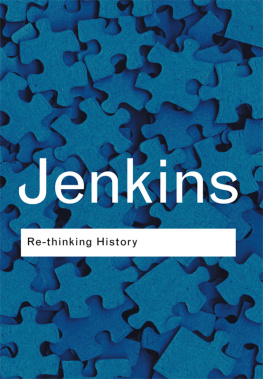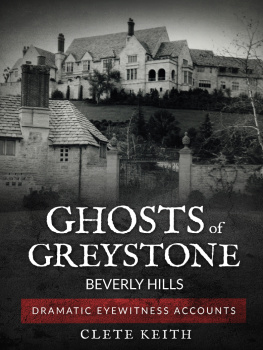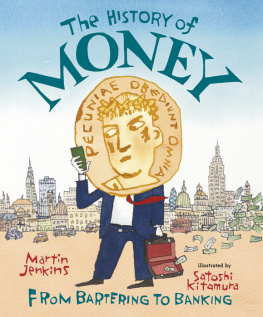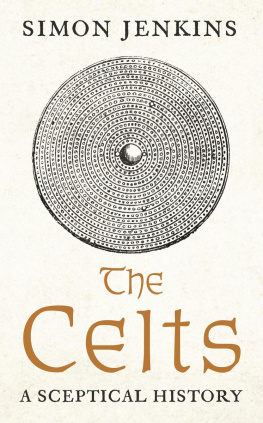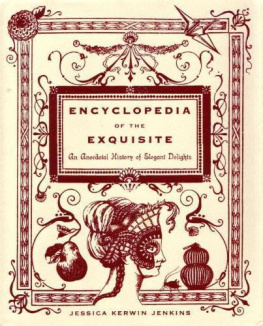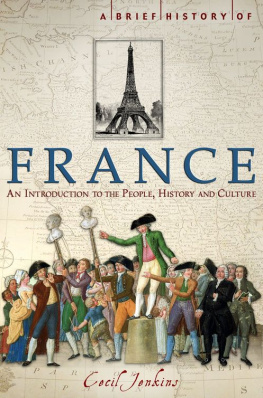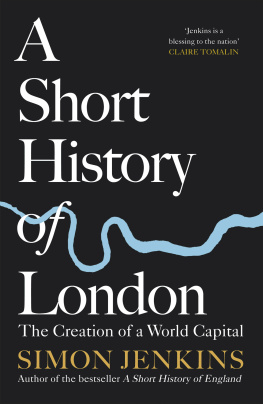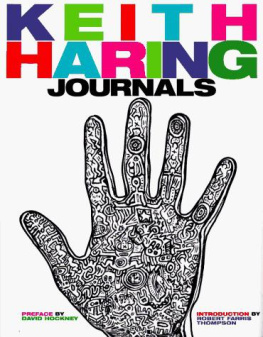Jenkins Keith - Re-thinking history
Here you can read online Jenkins Keith - Re-thinking history full text of the book (entire story) in english for free. Download pdf and epub, get meaning, cover and reviews about this ebook. City: London, year: 2004, publisher: Taylor and Francis, genre: Religion. Description of the work, (preface) as well as reviews are available. Best literature library LitArk.com created for fans of good reading and offers a wide selection of genres:
Romance novel
Science fiction
Adventure
Detective
Science
History
Home and family
Prose
Art
Politics
Computer
Non-fiction
Religion
Business
Children
Humor
Choose a favorite category and find really read worthwhile books. Enjoy immersion in the world of imagination, feel the emotions of the characters or learn something new for yourself, make an fascinating discovery.
- Book:Re-thinking history
- Author:
- Publisher:Taylor and Francis
- Genre:
- Year:2004
- City:London
- Rating:4 / 5
- Favourites:Add to favourites
- Your mark:
- 80
- 1
- 2
- 3
- 4
- 5
Re-thinking history: summary, description and annotation
We offer to read an annotation, description, summary or preface (depends on what the author of the book "Re-thinking history" wrote himself). If you haven't found the necessary information about the book — write in the comments, we will try to find it.
Re-thinking history — read online for free the complete book (whole text) full work
Below is the text of the book, divided by pages. System saving the place of the last page read, allows you to conveniently read the book "Re-thinking history" online for free, without having to search again every time where you left off. Put a bookmark, and you can go to the page where you finished reading at any time.
Font size:
Interval:
Bookmark:
Far and away the best introduction to the state of the question currently available.
Hayden White, University of California at Santa Cruz
It is a model of concise argument and poses fundamental questions concerning the nature of historiography in a post modernist world.
Alan White, University of East London
An excellent introduction to historical method.
Kevin Harrison, Mancat School
A valuable, concise introduction to the influence of post-modernism on history.
M. Thomson, Sheffield University
A challenging book which makes accessible recent developments in the philosophy of history.
David Dean, Goldsmith College, University of London
An excellent introductory text to the field, a very manageable and accessible work written in an attractively informal style.
C. M. Williams, University of Wales
Keith Jenkins Rethinking History is a startlingly clear and thoughtprovoking introduction to current central debates in history and historiography. It is accessible to history students, students in subjects that draw on historical past and to the general reader. Already, a classic text book.
Robert Eaglestone, Royal Holloway, University of London
Keith
Jenkins
Re-thinking History
With a new preface and conversation with the
author by Alun Munslow

First published 1991
by Routledge
First published in Routledge Classics 2003
by Routledge
11 New Fetter Lane, London EC4P 4EE
29 West 35th Street, New York, NY 10001
Routledge is an imprint of the Taylor & Francis Group
This edition published in the Taylor & Francis e-Library, 2004.
1991 Keith Jenkins
Preface to Routledge Classics edition and In Conversation: Keith Jenkins and Alun Munslow 2003 Alun Munslow
All rights reserved. No part of this book may be reprinted or reproduced or utilized in any form or by any electronic, mechanical, or other means, now known or hereafter invented, including photocopying and recording, or in any information storage or retrieval system, without permission in writing from the publishers.
British Library Cataloguing in Publication Data
A catalogue record for this book is available from the British Library
Library of Congress Cataloging in Publication Data
A catalog record for this book has been requested
ISBN 0-203-42686-X Master e-book ISBN
ISBN 0-203-43977-5 (Adobe eReader Format)
ISBN: 0-415-30443-1 (pbk)(Print Edition)
For Sue Morgan with much love
PREFACE TO THE ROUTLEDGE CLASSICS EDITION BY
ALUN MUNSLOW
IN CONVERSATION: KEITH JENKINS AND ALUN
MUNSLOW
Every discipline, I suppose, is, as Nietzsche saw most clearly, constituted by what it forbids its practitioners to do. Every discipline is made up of a set of restrictions on thought and imagination, and none is more hedged about with taboos than professional historiography so much so that the so-called historical method consists of little more than the injunction to get the story straight (without any notion of what the relation of story to fact might be) and to avoid both conceptual overdetermination and imaginative excess (i.e., enthusiasm) at any price.
Yet the price paid is a considerable one. It has resulted in the repression of the conceptual apparatus (without which atomic facts cannot be aggregated into complex macrostructures and constituted as objects of discursive representation in a historical narrative) and the remission of the poetic moment in historical writing to the interior of the discourse (where it functions as an unacknowledged and therefore uncriticizable content of the historical narrative).
Those historians who draw a firm line between history and philosophy of history fail to recognise that every historical discourse contains within it a full-blown, if only implicit, philosophy of history. The principal difference between history and philosophy of history is that the latter brings the conceptual apparatus by which the facts are ordered in the discourse to the surface of the text, while history proper (as it is called) buries it in the interior of the narrative, where it serves as a hidden or implicit shaping device.
Hayden White, Tropics of Discourse, pp. 1267
Every discipline, I suppose, is, as Nietzsche saw most clearly, constituted by what it forbids its practitioners to do. Every discipline is made up of a set of restrictions on thought and imagination, and none is more hedged about with taboos than professional historiography so much so that the so-called historical method consists of little more than the injunction to get the story straight (without any notion of what the relation of story to fact might be) and to avoid both conceptual overdetermination and imaginative excess (i.e., enthusiasm) at any price.
Yet the price paid is a considerable one. It has resulted in the repression of the conceptual apparatus (without which atomic facts cannot be aggregated into complex macrostructures and constituted as objects of discursive representation in a historical narrative) and the remission of the poetic moment in historical writing to the interior of the discourse (where it functions as an unacknowledged and therefore uncriticizable content of the historical narrative).
Those historians who draw a firm line between history and philosophy of history fail to recognise that every historical discourse contains within it a full-blown, if only implicit, philosophy of history. The principal difference between history and philosophy of history is that the latter brings the conceptual apparatus by which the facts are ordered in the discourse to the surface of the text, while history proper (as it is called) buries it in the interior of the narrative, where it serves as a hidden or implicit shaping device.
Hayden White, Tropics of Discourse, pp. 1267
Everything, everybody and every book have a history. What Keith Jenkins' book Re-Thinking History, published in 1991, made us all aware of is that such histories are, indeed, just that. They are only histories. This means we would do well to recognise and remember that the histories we assign to things and people are composed, created, constituted, constructed and always situated literatures. And, what is more, they carry within them their author's philosophy or take on the world present, past and future. Such is the importance and influence of this book, especially among the younger generation of history students, that it now seems quaintly old fashioned to bother to point out that history is not the same as the past. By the same token that as a form of knowledge history is plainly and palpably a narrative representation.
That history is not some kind of mirror of past reality (and not because it is distorted by the bees in the bonnet of the historian, or their poor inference, or the poverty of their sources) seems a pretty obvious thing to say these days. This, the essential historicist message of Re-Thinking History has, of course, itself a history. Keith Jenkins admits his indebtedness at the outset with the lengthy quotation from the American philosopher of history Hayden White. What White is pointing to is what Keith Jenkins views as the doubtful belief still shared by a great many historians that we can know
Font size:
Interval:
Bookmark:
Similar books «Re-thinking history»
Look at similar books to Re-thinking history. We have selected literature similar in name and meaning in the hope of providing readers with more options to find new, interesting, not yet read works.
Discussion, reviews of the book Re-thinking history and just readers' own opinions. Leave your comments, write what you think about the work, its meaning or the main characters. Specify what exactly you liked and what you didn't like, and why you think so.

